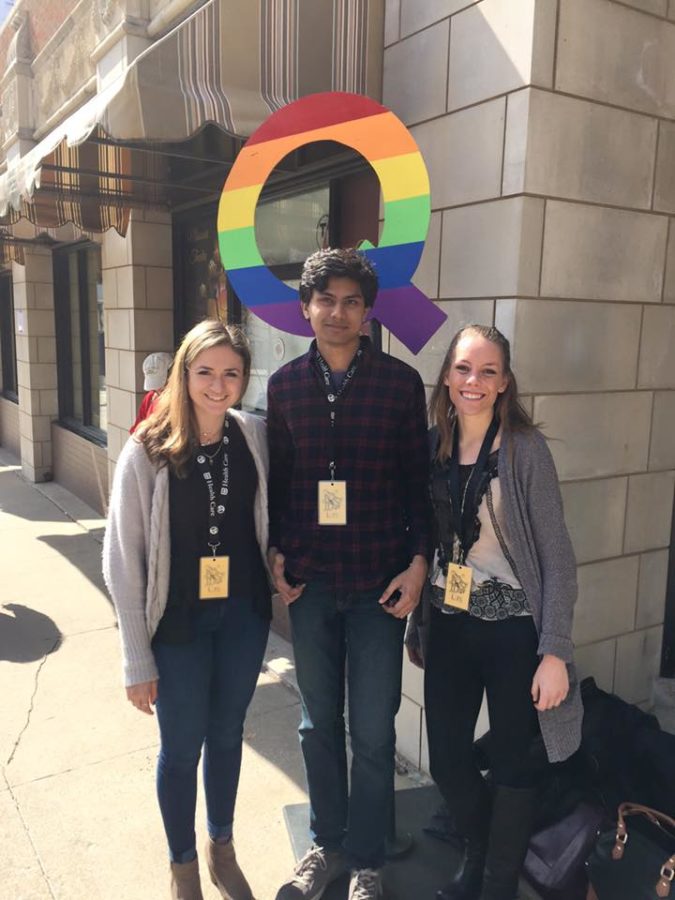Ebert continues to assist University students through fellowships, center offering programming
The 2015 Ebert fellows Shalayne Pulia, Ashish Valentine and Riane Lenzer-White at the True/False Documentary Film festival in Columbia, Missouri. The festival was held in March.
Mar 28, 2016
Roger Ebert was much more than a critic — he was a lover of film and a champion of movies. With a newly founded Ebert fellowship program at the University of Illinois, students are trying to follow his footsteps.
Because Roger was known for being a mentor to young critics, the Ebert fellowship program takes a professional mentor and matches them with three students as Ebert Fellows in Media Criticism.
Chaz and Roger Ebert established the Roger Ebert Center in 2009 and initiated its first class of Ebert fellows in 2015: Shalayne Pulia, Riane Lenzer-White and Ashish Valentine.
All three are seniors studying areas related to writing: Pulia in news-editorial journalism, Lenzer-White in broadcast journalism and Valentine in English literature, text and culture.
The fellowship program will continue each year with a new induction of fellows at each year’s Ebertfest. When the center was announced, the College of Media began creating ideas on what programming to offer. It realized that criticism is a difficult area for people to teach because it requires some experience and someone fluent in it, College of Media Dean Jan Slater said.
Get The Daily Illini in your inbox!
Chicago Tribune chief film critic Michael Phillips helps mentor and provides feedback for the fellows’ work. Phillips knew Roger Ebert very well and comes to Champaign frequently to spend one-on-one time with the students, Slater said.
“I am proud of how my work has grown through this fellowship and the confidence I have gained in entertainment writing. I have learned that there is absolutely no reason to shy away from a big opportunity like interviewing an Emmy-nominated documentary film director or tracking down a senior editor at Pitchfork Review,” Pulia said. “I may be a student, but I have a voice. My questions and critical analysis of these cultural events are no less important than those of seasoned professionals.”
Fellows have covered various events in the film industry, such as attending the True/False Film Festival in Missouri, covering the “Star Wars: The Force Awakens” release for WBEZ through a podcast and writing various reviews, which have been published in The Daily Illini.
“I think my favorite part is being able to write creatively,” Lenzer-White said. “In journalism, everything is so fact-based, so not having to be objective has really brought out my more artistic side.”
Slater said each year a new mentor will come to teach the fellows, but Phillips is continuing this year due to his close proximity to the campus.
Fellows do not have to be enrolled in the College of Media, but they must attend the University. They receive a $3,000 stipend.
Beyond fellowships, Ebert’s endowment will also provide programming through the Ebert Center. The College of Media has worked with Chaz and a faculty committee to develop ways that students can learn beyond a classroom setting by creating bodies of work and receiving first-hand experience, Slater said. In the future, the center will offer special classes to complement the College’s Media and Cinema Studies degree program and invite special scholars to come to campus and give panels. The Ebert Center will also undertake hosting the Roger Ebert’s Film Festival.
Slater said one of the center’s goals is to bring the film industry and the students together to help develop the industry. Historically, the University has developed many items for the film industry, so the center is trying to collect data on that to showcase its history in the industry.
“The center itself is about exposing. It is open to the community. We want it to be open to people in the Champaign-Urbana area, but also in Chicago. We want it to have student opportunities and to connect the industry with the campus because Roger was very much a supporter of the storytelling behind film,” Slater said.
The center is halfway to its goal to raise $5 million, and donors can give funds online now.
“It’s certainly a great opportunity for this community, which was so important to Roger,” Slater said. “To have (the Roger Ebert Center) in his name really epitomizes the things he believed in and the things he always wanted us to know about film. We really want to make sure that we are doing the kinds of programming that would be in his philosophy. It’s focusing much broader than just criticism.”






